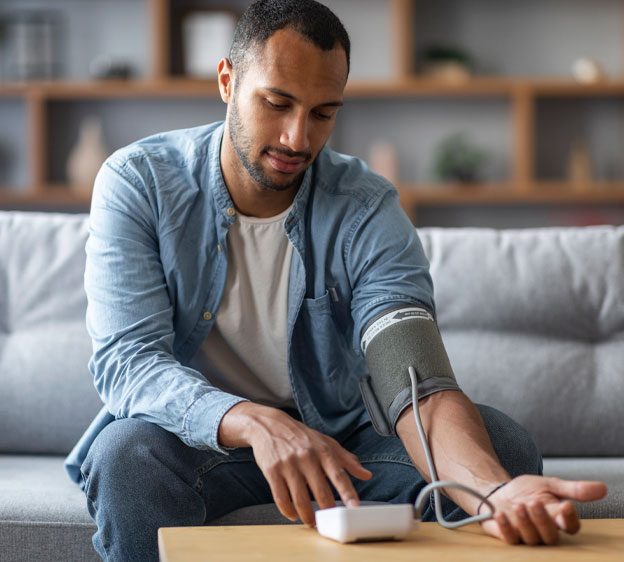Answers to Your Questions About Blood Pressure Medication Side Effects
August 22, 2023
High blood pressure is incredibly common in the United States. In fact, the Centers for Disease Control and Prevention reports that nearly half of all Americans age 18 and older have high blood pressure (hypertension).
If you have high blood pressure, you may be starting a new blood pressure medication and wondering what to expect. Knowing the basics about possible blood pressure medication side effects is a good place to begin. If you have specific questions about your blood pressure medication, it’s best to talk to your provider or a pharmacist, but we’ve compiled the answers to some common questions below.
Read More: The Links Between High Blood Pressure and Heart Disease
Q: What Are Common Side Effects of Blood Pressure Medications?
A: There is a wide variety of blood pressure medications, which work in slightly different ways to achieve the same result. Because the medications work differently, they can also cause distinct side effects.
- ACE inhibitors. Angiotensin-converting enzyme (ACE) inhibitors cause the body to produce less of a chemical called angiotensin, and they relax blood vessels and restore normal blood flow. These medications can cause dizziness, a chronic cough, fainting, high potassium levels and low blood pressure.
- ARBs. Like ACE inhibitors, angiotensin II receptor blockers (ARBs) also work to reduce the impact of angiotensin and keep blood vessels open. They cause similar side effects to ACE inhibitors.
- Calcium channel blockers. These medications also help to open up blood vessels, but they do so by preventing calcium from entering the muscle cells of the heart and arteries. These medications can cause dizziness, swollen ankles, headaches and gastrointestinal issues, such as constipation.
- Beta blockers. Beta blockers lower a person’s heart rate and the heart’s workload, which reduces blood pressure. Common side effects include dizziness, insomnia, a slow heartbeat, constipation and erectile dysfunction.
- Diuretics. Used with the medications above to control blood pressure, diuretics rid the body of excess sodium and water, lowering blood pressure as a result. A common side effect of diuretics is low potassium.
Read More: Blood Pressure: A Silent Killer
Q: Should I Stop Taking My Medication If It Causes Side Effects?
A: While the side effects of blood pressure medication may be unpleasant, it’s best to continue taking the medication until you can talk to your doctor and describe what you’re experiencing.
Discontinuing blood pressure medication suddenly can cause serious health issues, including dangerously high blood pressure, chest pain and a fast heartbeat. If your provider recommends discontinuing the medication or switching to another one, he or she will provide specific guidance about stopping the medication in a safe way.
In some cases, you may have more serious side effects that require a medical visit instead of a phone call. Seek immediate medical attention if you experience chest pain, fainting, an irregular heartbeat, swelling of the extremities, difficulty breathing or sudden, unexplained weight gain.
Q: What Kind of Blood Pressure Medication Causes the Least Side Effects?
A: There’s some evidence that ARBs cause fewer side effects in people just starting treatment for high blood pressure. However, everyone reacts to medications differently, and your provider may not feel that ARBs are the right treatment for you.
Finding the right blood pressure medication and dosage may require some trial and error. Your provider will make a recommendation based on factors including how high your blood pressure is, your overall health and other medications you take.
“Our No. 1 goal in treating high blood pressure is to maintain it within a healthy range to prevent any progression into potential long-term health complications,” says Tara Kay, MMS, PA-C, of Beaufort Memorial Heart Specialists. “As providers, we always try to tailor our management to the individual patient and take into account numerous factors, including using medications with the fewest side effects (ideally).”
Q: What Are the Risks of Untreated High Blood Pressure?
A: “While it’s normal for blood pressure to occasionally fluctuate, persistently high blood pressure over time can cause significant damage to our blood vessels throughout the entire body and eventually lead to irreversible disease in other vital organs, including your heart, kidneys and even your eyes,” Kay says. “That is why they often call it the silent killer because without routine blood pressure monitoring and appropriate medication treatment, you may not even notice the harm it is causing until it becomes more severe.”
A primary care provider can help you manage high blood pressure. Find a primary care provider accepting new patients.

